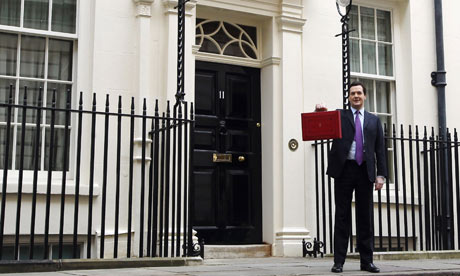There are a few rather crucial flaws in the chancellor's plans for Britain's future ...

Britain can be the new Germany. That was the gist of George Osborne's second budget, in which he sketched out the changes that would be needed to transform clapped-out and debt-sodden Britain into a country that once again makes stuff. The chancellor has a gleaming vision of the future. No longer will the UK be Europe's offshore hedge fund, a paradise for the spivs and snake oil salesmen of the City peddling their worthless bits of paper. Instead, a new army of apprentices will troop off to work for environmentally friendly businesses supported by a Green Investment Bank. Out will go the economy dangerously skewed towards asset-price speculation. In will come an economy "carried aloft by the march of the makers".
Marvellous stuff. Who could possibly argue with a better balanced Britain, one in which the workforce has better skills and small businesses are able to get access to the funds they need to set up a business? As Osborne went through his plans for a supply-side revolution, it was hard not to admire the beauty and elegance of what the chancellor has in mind.
Especially since he fulfilled one of the key tasks of any chancellor – to raise money without creating too many losers. He raised a couple of billion from the North Sea oil companies, another billion from cracking down on rich tax avoiders (if he's lucky) and just over £600m from the banks. Nobody will shed too many tears for any of them.
Equally, the chancellor parcelled out the money quite carefully; a bit here for first-time buyers, a sweetener for big business in the shape of a bigger than planned 2p cut in corporation tax, and the re-cycling of the North Sea oil windfall into a cut in fuel duty. The tax break for motorists was kept back to give the speech a populist flourish in the manner patented by Gordon Brown during his long stint at the Treasury, although it did jar a bit with the chancellor's boast of this being the greenest government in history.
There was, though, a bigger problem with the speech. It was that the plan for growth takes place against a backdrop of an economy that is cooling rapidly, with consumer confidence on the floor, unemployment rising and real incomes being squeezed. Osborne admitted that the independent Office for Budget Responsibility had again downgraded its forecast for growth and now believes that output will expand by 1.7% this year. Slower growth will mean increased spending on unemployment and other welfare benefits, adding £10bn to borrowing each year for the rest of this parliament.
What has happened since the election is that the economy has rapidly lost momentum, with growth of 1.1% in the second quarter of last year followed by 0.7% in the third quarter and a (snow-affected) contraction of -0.6% in the final three months of 2010. The chances of the economy remaining weak are high. VAT was increased to 20% in January, national insurance is going up next month to coincide with the start of a four-year programme of fiscal tightening that will suck around £20bn a year out of the economy.
In those circumstances, the sensible approach would be to ease up on the pain a bit, to spread the deficit reduction over a longer period of time and to provide some short-term help to the economy through cuts in national insurance contributions and measures specifically targeted at youth unemployment.
Osborne is unable to do this for two reasons; he would have to admit that Labour was right to propose a more measured approach to deficit reduction and he fears losing credibility with the financial markets by softening his approach. The chancellor's reputation will, of course, be seriously tarnished if an overdose of austerity craters the economy this year, but nonetheless he is boxed into the strategy sketched out in last year's budget and comprehensive spending review.
The chancellor glossed over this in his speech. He suggested that the rescue phase for the economy was over, and about to be replaced by reform and recovery. That's a nice soundbite, which would have had more substance six or nine months ago when the economy actually seemed to be on the mend. In March 2011, plans to reform the Outer Space Act – laid out in the Treasury's 126-page growth plan – while the outlook is for unemployment among the under-25s to breach the million mark this spring suggest Osborne is living on a different planet from the rest of us.
Let's be clear. The chancellor is quite right to say that the economy's deep structural imbalances contributed to the length and severity of the recession. It is, perhaps, a bit late in the day for the party that destroyed manufacturing in the 1980s, deregulated the financial markets and set the City on its road to dominance with the Big Bang reforms of 1986 to cuddle up to industry, but better late than never.
Commending Osborne for identifying the challenge, however, is not the same as saying he has the answers. The budget was far too timid for the free-marketeers. It was a do-nothing budget according to the Keynesians. It continued the approach, followed by all governments, of taking money from the North Sea and blowing it on consumption rather than using it to offset the deep cutbacks in investment caused by the cuts.
But the real criticism of this budget is that it is not a budget for growth. To the extent that this is a German-style plan it resembles that designed by Count Alfred von Schlieffen, which came up with the idea of a bold encircling manoeuvre round Paris as a way of knocking France out of the first world war within weeks of the opening of hostilities. That didn't work either, although it looked great on paper.


No comments:
Post a Comment